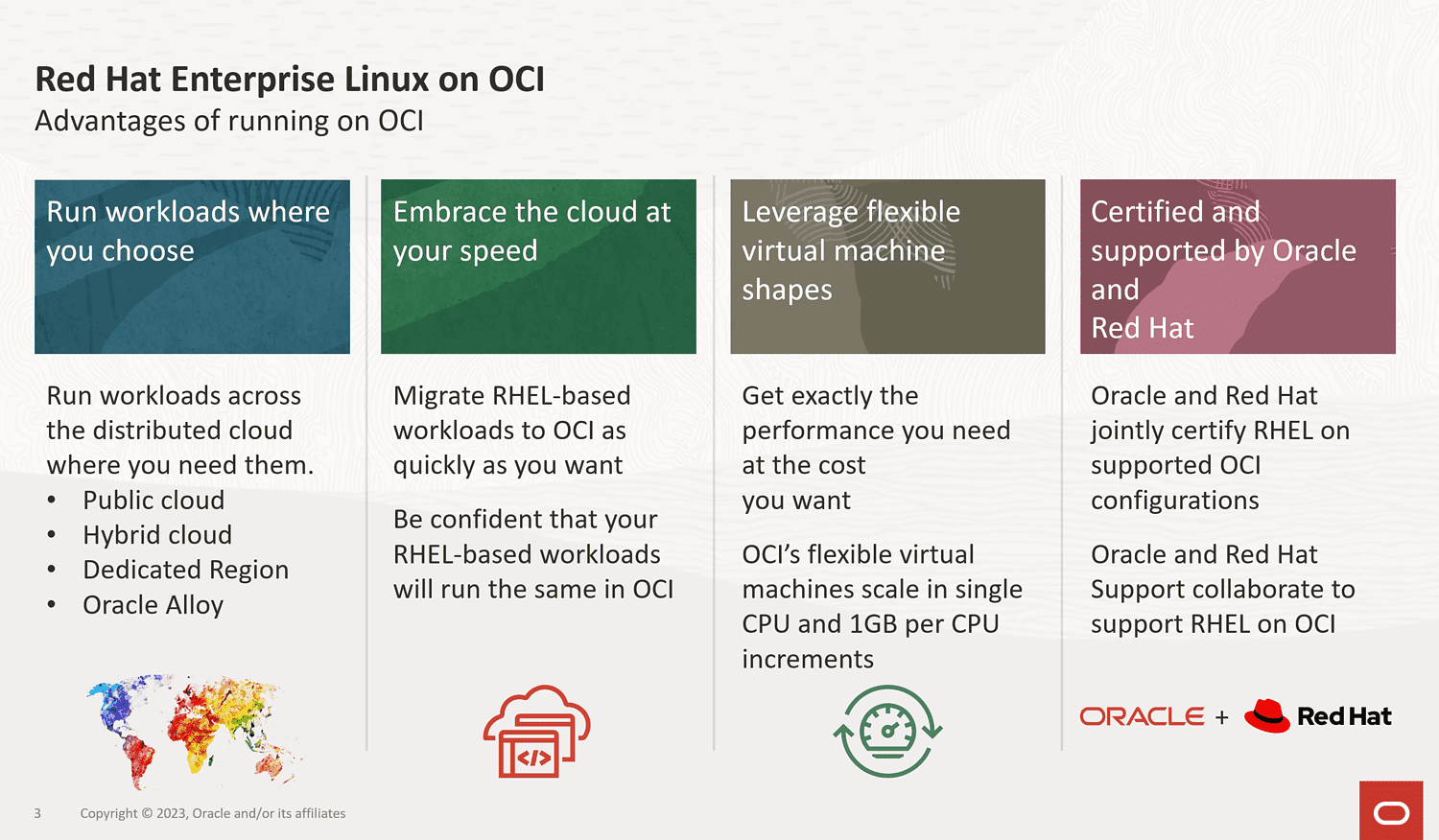Joint offering with full support from Red Hat and Oracle should make it easier for RHEL users to migrate to the cloud.
Oracle and Red Hat today announced the availability of Red Hat Enterprise Linux (RHEL) on OCI. With this, the vendors want to entice on-prem users of RHEL in particular to move toward the cloud. In this case, of course, that is Oracle Cloud Infrastructure (OCI). The main reason for this move is that both Red Hat and Oracle regularly received requests to offer it. Given that some 90 percent of the Fortune 500 uses both Oracle and Red Hat, today’s announcement is quite a logical move.
Of course, it was already possible to install RHEL within OCI, but that had to be done through Oracle Linux. With today’s announcement, there is a fully certified and supported option by both parties.
Support for all OCI variants
Oracle says it is committed to making everything it does in the cloud as widely available as possible. Today’s announcement underlines this. All variants of OCI are supported for RHEL deployment. In addition to the public cloud, also government-specific clouds in different territories, the sovereign cloud regions that will become available this year and also the recently announced Oracle Alloy. The latter allows Oracle partners to connect their services to a white-label variant of OCI, with support for all services.
Also when it comes to the architecture on which the virtual machines run, there is full support for RHEL on OCI. That is, both Intel and AMD are supported, as well as virtual machines running on the Ampere Altra-based arm servers. Here it is worth noting, however, that particularly in the area of AMD and Arm there is a limitation. Red Hat supports these only from version 8.7 of RHEL. So the versions from 7.9 to 8.7, for which support ends on June 30, 2024, do not support it.

Limitations of RHEL on OCI
The new offering has some limitations at launch. The current focus is on virtual machines as the environment in which RHEL runs. During a briefing, Leo Leung, VP of OCI and Oracle Technology did indicate that support for RHEL on baremetal is also coming. It is also worth noting that only the standard images are currently supported. Support for custom images, which you can build with RHEL’s custom image builder, will follow later.
Good to note in this regard is that the collaboration between Oracle and Red Hat around RHEL is one around the bring your image concept. That is, there are no managed services rigged around it by Red Hat and Oracle. However, that is not to say that this is not going to happen. In fact, according to Leung, SIs are very interested in this joint offering. Those can develop these services, of course. The same goes for the support for custom images we talked about above.
RHEL on OCI is the beginning of broader collaboration
According to Leung, today’s announcement is certainly not the last thing we can expect from Red Hat and Oracle together. Of course, the RHEL on OCI offering will be expanded, but there will also be other areas to come. When we hear that, we immediately think of OpenShift, Red Hat’s Kubernetes platform. That would also fit well with what Leung calls the finesse of OCI. It is possible to get exactly the compute (number of cores) you need for your workload. Within containers and Kubernetes, at least in theory, such fineness have more impact than in somewhat older, monolithic environments.
At this point, however, Leung is not making any firm statements about what they are collectively working on, other than to say that they will soon come up with support for baremetal. So we will have to wait and see what the next steps will be.
What about Oracle Linux?
We were unfortunately unable to attend the briefing surrounding the announcement of RHEL on OCI live. Otherwise, we would have asked what this announcement means for Oracle Linux. That is basically a clone of RHEL, with some specific optimizations for Oracle environments. As far as we’ve heard, Red Hat was never too keen on Oracle releasing this proprietary variant.
The formal support and certification of RHEL on OCI by both parties must have implications for Oracle Linux, one would think. At least you won’t have to install RHEL through Oracle Linux Premier Support from now on. It would also not surprise of Oracle Linux will take a back seat from now on. Or perhaps it will be limited to a specific target group, for example only medium-sized companies.
We asked Oracle about this, and are waiting for a response. When we get that, we will update this article.
Update 1-2: We received the following statement from Oracle about what the collaboration with Red Hat around bringing RHEL to OCI means for Oracle Linux:
“We are not changing our strong commitment to Oracle Linux. Today’s announcement simply underscores our commitment to giving customers greater choice.”
Price and availability
RHEL on OCI is a bring your own subscription model. Its price will not change because of this partnership. Leung also makes it explicitly clear that Oracle and Red Hat want to get on-prem users of RHEL to the cloud in particular with this new offering. That means there are no costs associated with moving data to OCI. After all, there are no ingress fees that organizations have to pay. Actually running applications in RHEL, of course, does incur costs. The aforementioned fine-tuning that is possible within OCI should ensure that organizations can keep this under control.
The most important thing about this announcement, however, according to Leung, is definitely the collaborative support. If there is an issue, you can call one of them. That one will pick it up further, including the escalation to the other party involved in the partnership.
Red Hat Enterprise Linux is available starting today for all OCI environments that Oracle currently offers.
